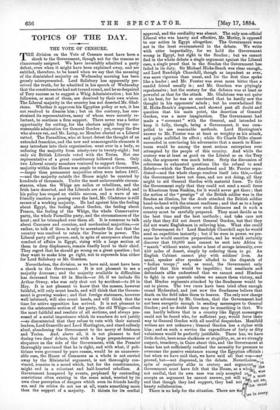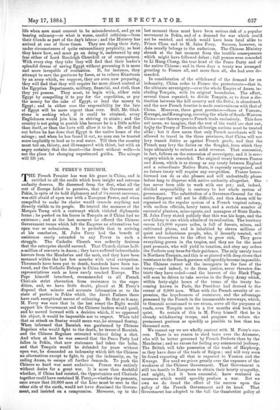TOPICS OF THE DAY.
THE VOTE OF CENSURE.
THE division on the Vote of Censure must have been a shock to the Government, though not for the reasons so clamorously assigned. We have invariably admitted a party defeat, even when it might have been explained away, and are entitled, therefore, to be heard when we say that the meaning of the diminished majority on Wednesday morning has been grossly misrepresented. Lord Salisbury has apparently per- ceived the truth, for he admitted in his speech of Wednesday that the constituencies had not turned round, and he so despaired of Tory success as to suggest a Whig Administration ; but his followers, or most of them, are deceived by their own wishes. The Liberal majority in the country has not deserted Mr. Glad- stone. Whether it approves his Egyptian policy or not, it has not resolved to dismiss him ; but on the contrary, has con- strained its representatives, many of whom were secretly re- luctant, to continue a firm support. There never was a better opportunity for ratting, for the electors might forgive un- reasonable admiration for General Gordon ; yet, except the five who always rat, and Mr. Laing, no Member elected as a Liberal ratted. The Parnellites, who at heart detest the thought of an extended franchise, and the new and unmanageable elements it may introduce into their organisation, went over in a body, so reducing the majority from ninety-two to twenty-eight ; but only six British Liberals voted with the Tories. Not one representative of a great constituency followed them. Only two Liberal county members ventured to support them. The majority within the House was ample to sustain a Government, —larger than permanent majorities often were before 1867, —and the majority outside the House might be counted by hundreds of thousands. Under the most unfavourable circum- stances, when the Whigs are sullen or rebellious, and the Irish have deserted, and the Liberals are at heart divided, and his policy has reaped no visible success, and a wave of un- friendly emotion is passing over the land, Mr. Gladstone is still secure of a working majority. He had against him the feeling about Egypt, the feeling about Gordon, the feeling about France, the feeling of the Whigs, the whole Conservative party, the whole Parnellite party, and the circumstances of the hour ; and he triumphed over them all. It is nonsense to talk about Caucuses and coercion, and mechanical majorities,—or rather, to talk of them is only to accentuate the fact that the country was resolved to retain the Premier in power. The Liberal party still govern, and, in spite of annoyance about the conduct of affairs in Egypt, rising with a large section of them to deep displeasure, remain fixedly loyal to their chief. They regret that he should go wrong on a great question ; but they want to make him go right, not to supersede him either for Lord Salisbury or Mr. Goschen.
Nevertheless, the division, as we have said, must have been a shock to the Government. It is not pleasant to see a majority decrease ; and the majority available in difficulties has decreased from 49 in March—or 50, if we include Sir Arthur Otway, who was only shut out by accident—to 28 in May. It is not pleasant to know that the masses, however faithful, will only count heads, and will think that the Govern- ment is growing weaker ; and that foreign statesmen, however well informed, will also count heads, and will think that the time for active opposition has arrived. It is not pleasant to see the aristocratic section of the party, the old Whigs—often the most faithful and resolute of all sections, and always pos- sessed of a social importance which its numbers do not justify —so discontented that they refuse to vote with their natural leaders, Lord Granville and Lord Hartington, and stand sullenly aloof, abandoning the Government to the mercy of Irishmen
and Tories. And, above all, it is not pleasant to feel during two days' debate, that with a large preponderance of eloquence on the side of the Government, with the Premier thoroughly convinced that he is right, and with what, if poli- ticians were governed by pure reason, would be an unanswer- able case, the House of Commons as a whole is not carried away by the Ministerial argument, is not thoroughly con- vinced, remains in a mood which, but for the constituencies, might end in a reluctant and half-hearted rebellion. A Government hampered by events, perplexed by contending convictions often existing in the same mind, worried by its own clear perception of dangers which even its friends hardly see, and its critics do not see at all, wants something more
than the support of a majority. It thirsts for its cordial approval, and the cordiality was absent. The only non-official Liberal who was hearty and effective, Mr. Morley, is opposed to our action in Egypt altogether. The Government were not in the least overmastered in the debate. We write with utter impartiality, for we hold the Government wrong in Egypt, but right in the Soudan ; but we cannot find in the whole debate a single argument against the Liberal case, a single proof that in the Soudan the Government has, failed in its duty. Sir Michael Hicks-Beach was clear enough,. and Lord Randolph Churchill, though as impudent as ever, was more vigorous than usual, and for the first time spoke like a leader ; and Mr. Forster was even more bitter than a candid friend usually is ; and Mr. Goschen was pityingly reprehensive ; but the oratory for the defence was at least aa powerful as that for the attack. Mr. Gladstone was not quite at his best, for he was so convinced that he hardly saw the thought in his opponents' minds ; but he overwhelmed Sit M. Hicks-Beach's argument, and showed past all doubt and question that his main point, the desertion of General Gordon, was a mere imagination. The Government had made a " covenant " with the General, and intended tc. keep it fully, though, being a Government, it was com- pelled to use reasonable. methods. Lord Hartington'a answer to Mr. Forster was at least as weighty as his attack, and quite nullified its effect ; while Sir Charle Dilke almost succeeded in convincing his adversaries that a march to Khar- toum would be among the most serious enterprises ever attempted by the people of this country. And while the oratory was at least as good on the Liberal as on the Tory side, the argument was much better. Strip the discussion of references to exhausted questions like the refusal to send Zebehr—which the Tories abandoned and Mr. Forster repu- diated—and the whole charge resolves itself into this,—that the Government have not done, and are not doing, all they might to aid General Gordon with material force. To this the Government reply that they could not send a small force to Khartoum from Suakim, for it would never get there ; that the notion of the " prestige " of the British soldier was in the Soudan an illusion, for the Arab attacked the British soldier hand-to-hand with the utmost readiness ; and that as to a large force, such an expedition over such distances and in such a country must be carefully prepared. They must decide as to- the best time and the best methods ; and take care not only that they did not desert General Gordon, but that they did not waste Englishmen in relieving him. What else could any Government do ? Lord Randolph Churchill says he would send an expedition instantly ; but if he were in power, we pre- sume he would sanction preparation, and he would certainly discover that 10,000 men cannot be sent into Africa to "march" without water, under a heat of savage intensity, over 450 miles of desert, simply by ordering them to go. An English Cabinet cannot play with soldiers' lives. As usual, speaker after speaker alluded to the dispatch of "Indian troops ;" and, as usual, the Government only replied that this would be impolitic ; but assailants and defendants alike understood that we cannot send Hindoos to fight in our quarrels unless we assure them victory, and that Hindoo regiments attacked by the Soudanese would be cut to pieces. The two races have been tried often enough round Hyderabad, and just now the Soudanese believe that death on the field takes them to heaven. The only new charge was one advanced by Mr. Goschen, that the Government had not been energetic enough in sending messengers to General Gordon ; and no doubt there may be something in that. We can hardly believe that in a country like Egypt messengers could not be found who, for sufficient pay, would force their way to General Gordon with all needful despatches: Manifold writers are not unknown ; General Gordon has a cipher with him ; and on such a service the expenditure of forty or fifty volunteers would be perfectly justifiable. There has, we have little doubt, been some slackness or stupidity, or, as we strongly suspect, treachery, in Cairo about this, and the Government at home has not sufficiently realised the necessity for pressure to overcome the passive resistance among the Egyptian officials ; but when we have said that, we have said all that was—not proved, but—not disproved, in the debate. Nevertheless ." spite of superiority alike in oratory and argument.)- 'the Government must have felt that the House, as a whole s not cordial, that its own case was only accepted as, 2, was accepts an argument he cannot answer, yet will nç a man and that though they had support, they had not A a,ct on, hearty collaboration.17tb0 usual
There is no help for the situation. There are H
tea in every
life when men must consent to be misunderstood, and go on bearing calumny—or what is worse, candid criticism—from their friends as part of the day's labour ; and the Ministry has arrived at one of those times. They are doing their duty, under circumstances of quite extraordinary perplexity, as best they know how, and must go on doing it, undeterred by any fear either of Lord Randolph Churchill or of consequences. With every step they take they will find that their leader's splendid dream of saving Egypt without governing it is more and more incapable of realisation. If, for instance, they attempt to save the garrisons by force, or to relieve Khartoum by an army which, we suppose, they are even now preparing, they will find that they will require far more direct control of the Egyptian Departments, military, financial, and civil, than they yet possess. They must, to begin with, either ruin Egypt by compelling it to pay for the expedition, or pay the money for the sake of Egypt, or lend the money to Egypt ; and in either case the responsibility for the fate of Egypt will be more urgent than ever. Still, Mr. Glad- stone is seeking what, if it could be attained, every Englishman would join him in striving to attain ; and the country is not going to punish him because he is a little nobler than itself, or than the facts will allow it to be. He will find out before he has done that Egypt is the native home of the mirage ; and when he has found it out, no man can be trusted more implicitly to lead us to real water. Till then the country must toil on, thirsty, and ill-tempered with thirst, but with an angry certainty that the desert—the desert without wells—is not the place for changing experienced guides. The mirage will lift yet.



































 Previous page
Previous page